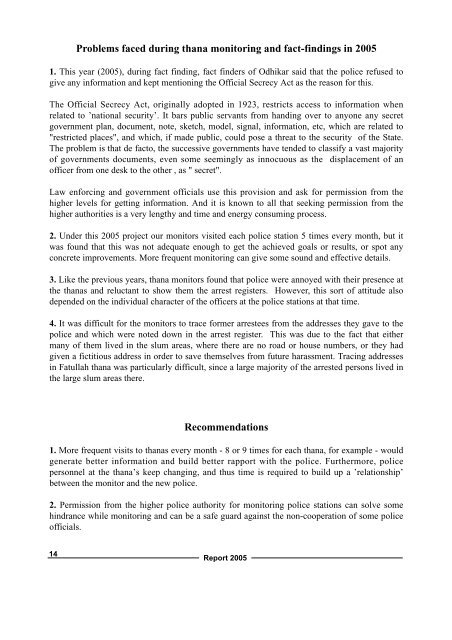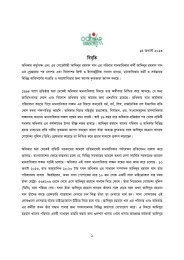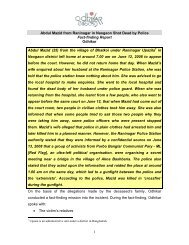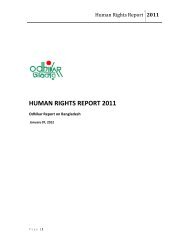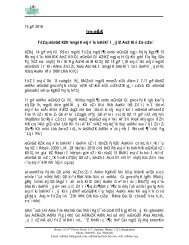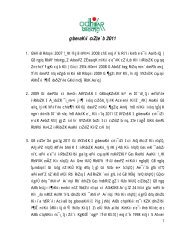Please - Odhikar
Please - Odhikar
Please - Odhikar
You also want an ePaper? Increase the reach of your titles
YUMPU automatically turns print PDFs into web optimized ePapers that Google loves.
Problems faced during thana monitoring and fact-findings in 2005<br />
1. This year (2005), during fact finding, fact finders of <strong>Odhikar</strong> said that the police refused to<br />
give any information and kept mentioning the Official Secrecy Act as the reason for this.<br />
The Official Secrecy Act, originally adopted in 1923, restricts access to information when<br />
related to ’national security’. It bars public servants from handing over to anyone any secret<br />
government plan, document, note, sketch, model, signal, information, etc, which are related to<br />
"restricted places", and which, if made public, could pose a threat to the security of the State.<br />
The problem is that de facto, the successive governments have tended to classify a vast majority<br />
of governments documents, even some seemingly as innocuous as the displacement of an<br />
officer from one desk to the other , as " secret".<br />
Law enforcing and government officials use this provision and ask for permission from the<br />
higher levels for getting information. And it is known to all that seeking permission from the<br />
higher authorities is a very lengthy and time and energy consuming process.<br />
2. Under this 2005 project our monitors visited each police station 5 times every month, but it<br />
was found that this was not adequate enough to get the achieved goals or results, or spot any<br />
concrete improvements. More frequent monitoring can give some sound and effective details.<br />
3. Like the previous years, thana monitors found that police were annoyed with their presence at<br />
the thanas and reluctant to show them the arrest registers. However, this sort of attitude also<br />
depended on the individual character of the officers at the police stations at that time.<br />
4. It was difficult for the monitors to trace former arrestees from the addresses they gave to the<br />
police and which were noted down in the arrest register. This was due to the fact that either<br />
many of them lived in the slum areas, where there are no road or house numbers, or they had<br />
given a fictitious address in order to save themselves from future harassment. Tracing addresses<br />
in Fatullah thana was particularly difficult, since a large majority of the arrested persons lived in<br />
the large slum areas there.<br />
Recommendations<br />
1. More frequent visits to thanas every month - 8 or 9 times for each thana, for example - would<br />
generate better information and build better rapport with the police. Furthermore, police<br />
personnel at the thana’s keep changing, and thus time is required to build up a ’relationship’<br />
between the monitor and the new police.<br />
2. Permission from the higher police authority for monitoring police stations can solve some<br />
hindrance while monitoring and can be a safe guard against the non-cooperation of some police<br />
officials.<br />
14<br />
Report 2005


